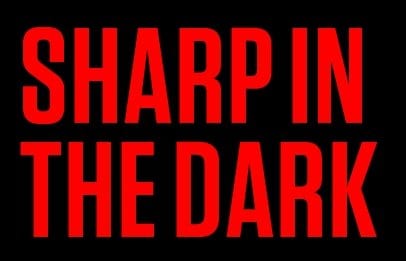By the time Sharp turned off Beverley Street into The Briar Apartments, it was just after 11. She locked her K-car and walked along a path that snaked behind a cluster of spruce trees linking the parking lot with the front door of the building.
She pulled open the heavy glass outer door, stepped into the tiled front hall of the 1940s apartment building and keyed herself past the security door. The Briar had three floors and no elevator. Sharp started climbing, slowly. On the third-floor landing, she walked the length of the hall to apartment 309, unlocked the door and stepped inside.
The first thing she saw was the blinking red light of her answering machine. Sharp slid off her fake-leather jacket, hit the message button and collapsed onto the modernist couch she’d found abandoned at the side of a curb once when she was tailing a cheater.
“Sid, where are you? It’s quarter after 11. We’re outside with the truck. Hello?” Meg’s strained voice, pretending to be cheerful, echoed around the room, making Sharp cringe.
Another beep meant another message. Meg again. This time, all cheerfulness, fake or not, was gone. “Carol and I have been here for over half an hour. Actually, nearly three-quarters of an hour. I guess you forgot our appointment. 11am, Monday, we arranged that I would pick up my plant, remember? I even wrote it on your calendar! No, of course you don’t remember, because you’re so out of it! Sid, I’ve had it. I really have.”
Sharp drove two fingers into her forehead. “The plant. Of course.” She glanced across the room at the massive ficus whose leaves brushed against the ceiling. Why did I ever agree to take it in the first place?
The machine beeped again. Sharp could hear a car honking in the background. She thought: She’s calling from the pay phone on the corner. She pictured Meg speaking into the receiver while rolling her eyes at Carol, Meg’s girlfriend before she met Sharp, as if to say, “I don’t know what I ever saw in her.” And Carol smiling sympathetically.
“What you ever saw in Carol is the real mystery,” Sharp said out loud.
“Okay, it’s been an hour. We’re leaving! And by the way, Carol rearranged her day so that I could use her truck, so this has been exceedingly inconvenient for everyone, and also —”
Sharp sat up. Someone was knocking on the door. She glanced at her wristwatch and frowned. 11:37pm. She hit the pause button on Meg’s exasperated voice and walked to the hall. Through the apartment door’s peephole a man’s distorted body appeared in the fisheye lens. He stood, legs apart, hands shoved in the pockets of a dark blue windbreaker. Sharp pulled open the door.
“I thought you didn’t have time for beers?” Sharp said, smiling.
Kevin Lee stepped inside.
“I don’t. This is business.” Lee walked into the living room and sat down.
“Huh?” She followed him and sat down on the striped beanbag chair that had been a present from her grandmother when Sharp was a teenager — and which she’d always meant to get rid of but somehow couldn’t bring herself to.
“I want the truth,” Lee looked at her. “No games, Sid. This is serious.”
“What’s serious? What are you talking about?” Sharp pushed her bangs back from her forehead and realized she was sweating.
“Your business card was found in the Iverson woman’s apartment. On her dresser,” he added with emphasis.
Sharp opened her mouth to speak, but Lee held up his hand.
“This afternoon you said you were . . .” Lee flipped through his notebook, found the page and read from it, imitating Sharp’s voice: “Just friends.” Lee slapped shut his notebook. “So what does ‘just friends’ mean — in your world?”
Sharp sighed loudly, registering her annoyance, but Lee kept right on. “Sid, this is a murder case. I need to know everything. How you met her, when, where, the whole shebang.” Lee opened his notebook again and flipped to a fresh page. “Okay, spill.”
Sharp exhaled loudly. “Fine. I met her at . . . at . . . The Gateway.”
Lee groaned. “What? She’s — gay?”
“I don’t know! I met her there, that’s all. It’s a public house! You went there with me once and you’re not gay. That was a really fun night, remember?”
Lee ignored her. “How did she get your card?”
Sharp shrugged. “We just got to talking and I said if you ever want to meet up again, just give me a call. When I heard about the murder, I remembered she told me she lived on Crossley Street. I don’t know why I thought it was her. I was hoping it wasn’t. I just — couldn’t believe it. I mean, what a coincidence.”
Now it was Lee’s turn to sigh. “Yeah, it’s a coincidence, all right.” He stood up and started for the door. His muscular shoulders sloped with exhaustion. He didn’t want this case to turn queer, but he had a feeling it already had. He looked back at her. “You’re levelling with me, right?”
“Of course.”
“You better be.” Lee took a step toward the door.
“Kevin?”
“Yeah?” He kept walking.
“When was she killed?”
He stopped and looked back at Sharp, eyeing her sideways. “Sunday night — just after 2am. Why? Think you’re going to catch the killer?”
Sharp frowned. “No, I’ll leave that to you. I was just — curious, that’s all.”
Lee looked at her. He shook his head.
“What?” Sharp leaned against the door frame, arms folded across her chest.
“If only you’d . . .”
“Been a cop?” Sharp smiled at Lee.
Sharp could recite this one off by heart, Lee had been saying it for so many years: “A private dick has no power. You’re going to have to call the cops anyway. Why not just be a cop? You’d make a good one.” Lee and Sharp met in high school. Their shared love of mysteries, puzzles and criminal intrigue bonded them for life.
When he got accepted into the police academy, Sharp spent hours with him learning secondhand how to be a cop, studying his textbooks and even taking target practice. He encouraged her to join up: “There are lots of female cops on the force. Well, a few. And some of them are even pretty cute,” he pointed out. Cuteness aside, Sharp wasn’t interested. She liked working alone — power or no power. Lee still couldn’t figure it out, and he had given up trying.
“Beers another time, okay?” Lee asked.
“Deal.”
Lee walked away down the hall.
Sharp closed the door, carefully pushed the deadbolt into place, then walked into the living room. Her eyes darted around the room. Some of the colour had left her face.
Why did I tell him that? Why didn’t I just tell the truth?
She turned back in the direction of the front door — then changed her mind. Nah, it’ll be okay, she thought.
But a lump in her stomach told her otherwise.
The red light on the answering machine was still flashing when Sharp walked into her bedroom and closed the door.


 Why you can trust Xtra
Why you can trust Xtra


